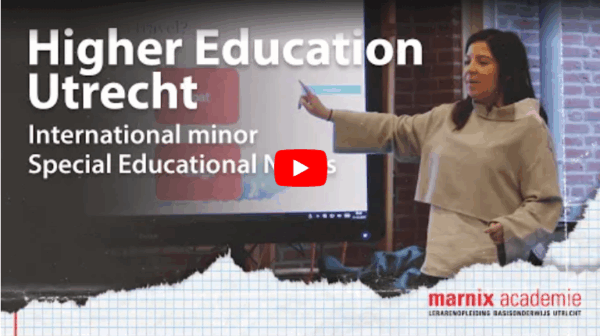Special Educational Needs
Develop a personal vision on special educational needs!
In this video one of our international students tells about her experiences with the minor Special Educational Needs.
The aims for the international program Special Educational Needs are focussed on special educational needs and the conditions and circumstances associated with such needs in an international context.
Students can apply for the course if they can show a stipulated level of English and if they master the basic principles of doing research. The language of the course will be English.
- Different aspects of the field of special educational needs will be offered. The following aspects are part of the program:
- Students develop a personal vision on education for children with specific needs.
- Knowledge about different learning- and behavioural difficulties (f.e. literacy, numeracy, oral language & communication, behavioural and psychiatric problems, for example ADHD and autism)
- Systematic educational strategies to implement conditions and circumstances associated with such specific needs.
- Doing research into a current dilemma within the field of special educational needs. Dilemma’s can come from political or the current developments. Central main point is the statement of Salamanca, a European declaration concerning the rights of children from 1994. All participants of the program conduct a common investigation.
Assessment and exams
- Vision: an evaluation on the argumentation of the vision of an individual student
- Action research: the assessment of an individual research, in which a student examines literature and translates these theoretical results into practice.
- Group research: a group of four students is critically assessed on a didactical, as well as content based assignment.
- Transfer: the way a student is able to transfer the thing he has learned, to his situation home.
Semester Program minor Special Educational Needs
Deadline to apply for the programme: 1 May The following subjects are part of the SEN-program in the Netherlands: We encourage students to do research from different points of view (society, school, teacher, pupil, learning environment and class management) and to strengthen their competences on creating education which is more suited to children with SEN. Classes and/or coaching sessions are two times a week, with a total of 5 hours a week. In some of the classes they will meet and work alongside Dutch students studying the same course (SEN). Besides classes students have time to work by themselves or in small groups on their assignments. Students make a digital assessment-file covering all parts of the SEN minor assignment. The educational design is closely related to the internship and the students perform their educational design in the internship school. Students make a report on their internship and have an assessment conversation with the teacher and the coordinator of teacher training in the school of internship.
When?
Who?
SEN Research / educational design (15 EC)
educational design in the Dutch primary education system. Objectives are:
– At the end of this course students can describe, explain, compare and analyse different visions on special and inclusive education. Plus: students can formulate and substantiate their vision on special and inclusive education.
– At the end of this course students will be able to reflect on SEN specific competences and will be able to identify and reach a personal learning objective by doing action research.
Internship (6 EC)
Dutch Language and culture (6 EC)
the governmental city of The Hague. Also, students are challenged to discover Utrecht and its surroundings in their free time. The students will take Dutch lessons. In this small course (14 education weeks, one hour a week) students will learn to introduce themselves in Dutch and understand and participate in a small conversation in internship.
Reading aloud a children’s book is trained in class and performed in the school of internship. Part of the language course is self-study with DuoLingo. (Students may propose alternative apps, please contact the teacher about this.)
Students make a digital assessment-file of several parts of the Dutch Language and Culture assignment.
Study Coaching (3 EC)
experiences in internship. Students make a digital assessment-file of several parts of the Study coaching assignment.
